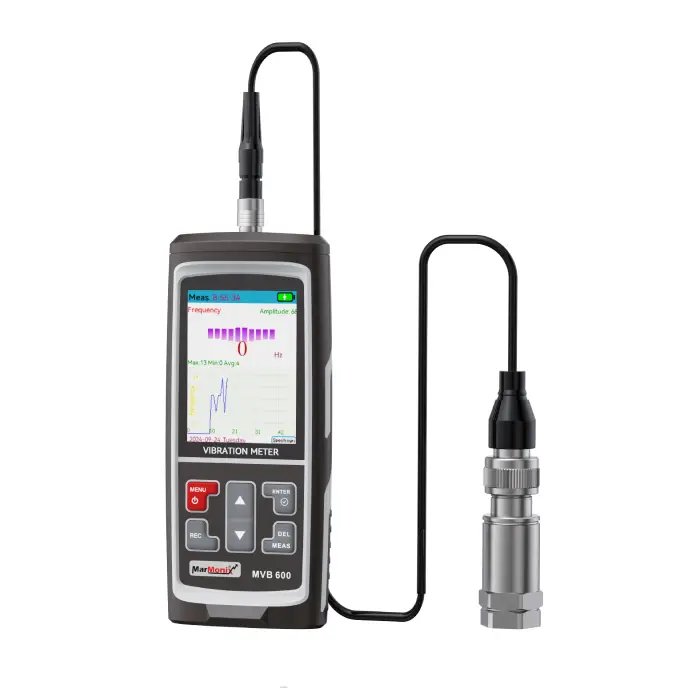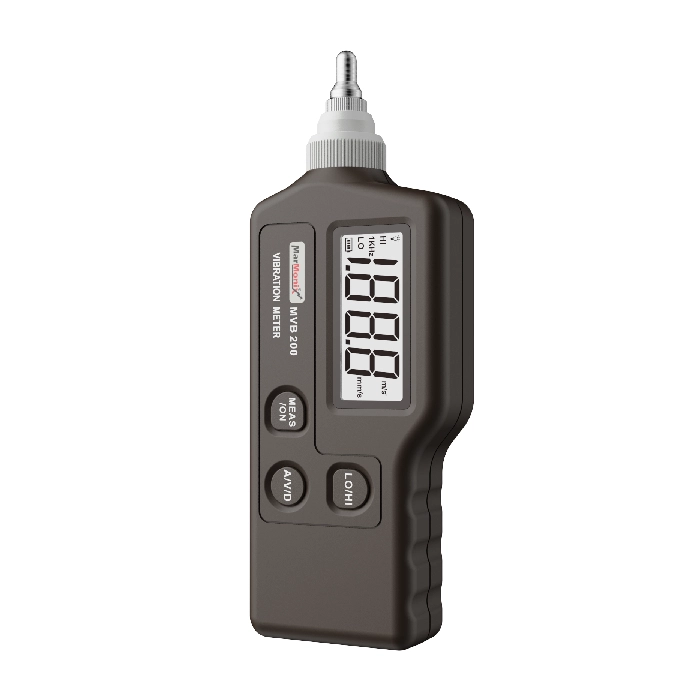Showing all 4 resultsSorted by price: high to low
Vibration Meter
A vibration meter, also known as a vibrometer or vibration tester, is an essential vibration measuring instrument designed to measure the intensity and frequency of vibrations in various industrial machines and structures. These vibration diagnostic devices are crucial for troubleshooting issues in rotating equipment, motors, pumps, and HVAC systems by detecting vibrations and oscillations that indicate imbalance, misalignment, or bearing wear.
vibration meter price
When it comes to planning your maintenance budget, understanding the vibration meter price and overall vibration tester cost is key. Our high-quality digital vibration meters and portable vibrometers are available at competitive prices, offering reliability and accuracy for all kinds of machine vibration measurement.
By investing in vibration diagnostic devices and predictive maintenance tools, you ensure optimal equipment performance, reduce downtime, and extend machine lifespan.
The pricing of vibration meters typically depends on several important factors:
-
Technology and Features: Advanced vibration analyzers with higher measurement accuracy, wide frequency range, and data logging capabilities naturally come at a higher price. Features like wireless connectivity, FFT vibration analysis, and real-time vibration monitoring also affect cost.
-
Build Quality and Durability: Industrial-grade vibration monitoring devices designed for harsh or hazardous environments are built with stronger materials and protection levels, which raises the price.
-
Brand and Manufacturer: Products from the best international brands — such as Fluke vibration meter, Extech vibration meter, SKF vibration meter, and Testo vibration analyzer — often come at a premium due to their proven accuracy, calibration standards, and after-sales service.
-
Calibration and Certification: Certified vibration meters with ISO calibration reflect additional testing and quality assurance, adding value to their price.
-
Supply Chain & Demand: Market trends, component availability, and industrial demand also influence vibrometer prices in the UAE.
Types of Vibration Meters
Vibration meters come in various types, each designed to meet specific needs depending on the application and industry. Here are some of the most common types:
Handheld Vibration Meter | portable vibration meter
These portable devices are designed for quick, on-the-go measurements, making them ideal for spot checks and basic vibration analysis in the field or on the factory floor. Handheld Vibrometers typically feature a simple interface and are user-friendly, allowing operators to assess machinery health with minimal training. They are particularly useful in situations where quick assessments are needed to detect anomalies that might indicate potential issues.
Data Logging Vibration Meter
Data logging vibration meters come with built-in memory, enabling them to record vibration data over extended periods. This capability is crucial for trend analysis and long-term monitoring, making these meters a valuable tool in predictive maintenance programs. By continuously tracking vibration levels, these meters help identify patterns that could signal emerging mechanical problems before they lead to equipment failure.
Wireless Vibration Meter
Wireless vibration meters offer the advantage of real-time data transmission and remote monitoring. These meters are particularly valuable in complex industrial environments where continuous monitoring of multiple assets is necessary. Wireless systems reduce the need for manual data collection, improving efficiency and enabling faster response times to potential issues. These meters are often integrated into broader condition monitoring systems, providing a holistic view of equipment health.
Triaxial Vibration Meter
Triaxial vibration meters measure vibration along three axes (X, Y, Z) simultaneously, offering a comprehensive analysis of vibration patterns. This capability is essential in applications where understanding the full spectrum of vibrations is crucial, such as in the automotive and aerospace industries. By capturing data across all three dimensions, triaxial meters provide more detailed insights into the behavior of machinery, helping engineers diagnose issues with greater precision.
High-Frequency Vibration Meter
High-frequency vibration meters are specialized devices designed to detect vibrations at higher frequencies. These meters are often employed in industries where precision is paramount, such as aerospace, high-tech manufacturing, and the production of delicate electronic components. High-frequency meters can detect subtle vibrations that might go unnoticed with standard meters, making them critical for maintaining the quality and integrity of sensitive equipment.
Vibration Meter with FFT Analysis
Vibration meters equipped with FFT (Fast Fourier Transform) analysis can break down complex vibration signals into their frequency components. This advanced feature allows users to pinpoint specific vibration sources and diagnose issues with a high degree of accuracy. FFT analysis is particularly useful in identifying the root causes of complex vibration problems, such as imbalances, misalignments, and bearing faults, making these meters indispensable in detailed diagnostics and maintenance planning.
buy vibration meter
When you're buying a vibration meter, making an informed decision can significantly impact the effectiveness of your maintenance and monitoring routines. Also to purchase a Vibrometers, there are several key factors to consider to ensure you select the right tool for your needs:
- Accuracy and Sensitivity: Choose a meter that offers high precision and can detect the smallest vibrations in various types of machinery.
- Range and Frequency: Ensure the meter covers the necessary frequency range suitable for your applications, from low-frequency vibrations typical in building structures to high-frequency vibrations in rotating machinery.
- Durability: Opt for a robust model that can withstand harsh industrial environments, if applicable.
- Ease of Use: Look for devices with intuitive interfaces, straightforward data logging, and easy connectivity options for data analysis.
- Support and Warranty: Consider the support services and warranty terms provided by the manufacturer. Reliable customer service is crucial for troubleshooting and maintenance tips.
MME-AE is a renowned importer and distributor of vibration testers in the UAE and various other countries, providing the most competitive prices in the market. For purchasing a vibration meter and obtaining detailed sound and Vibration Measurement Tools pricing information, we encourage you to get in touch with our experts at MME-AE.







 Bench Multimeters
Bench Multimeters